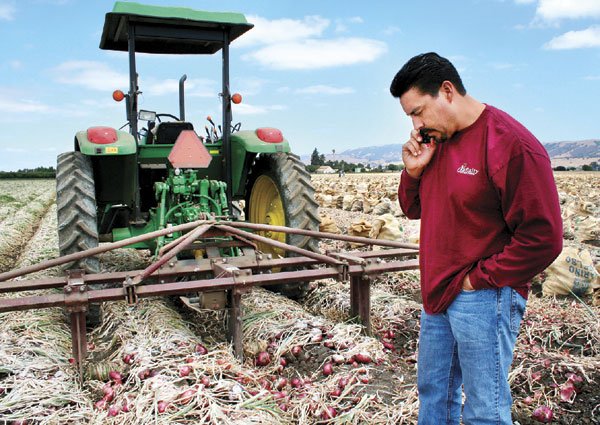Dawn has barely broken over the fields, and already, Ramiro
Rodriguez Jr.’s phone is ringing.
Gilroy – Dawn has barely broken over the fields, and already, Ramiro Rodriguez Jr.’s phone is ringing. He pauses, lowers the knife in one hand, the banana-like pepper in the other, and takes the call, a ring of sweatshirted field workers encircling him, waiting for his next instruction.
Rodriguez’ 16-hour days are punctuated minute-by-minute with the tolling of that phone: Farmers who need workers. Workers who need jobs. In the earthly economy from soil to Safeway, Rodriguez is the middleman, the farm labor contractor who brokers jobs for 900 field workers every summer, from Morgan Hill to San Juan Bautista. He has no charts, no spreadsheets – only a phone loaded with 500 numbers, a bachelor’s degree in international business, and a 27-year reputation built by his father, passed on to him.
“If you want to work, he’s the first one people look for,” said Luis Urias, a farmworker turned farm-owner. Twenty years ago, he moved to Gilroy from Sinaloa, Mexico and dialed Ramiro Rodriguez Sr., seeking a job. Today, he owns a farm, and rings up Rodriguez Jr. for laborers. “All of us farmers, we use these guys. Otherwise, we don’t have the time.”
Nearly 72 percent of California farmers who hire labor use FLCs, according to the 2002 Census of Agriculture – a dramatic increase from 1992, when only 33 percent did so, according to the University of California. In Gilroy, Uesugi Farms co-owner Pete Aiello says FLCs have boomed in importance in just a decade, and hiring directly is “a thing of the past.” Rodriguez’ phone rings, and rings and rings. He buys waterproof, dustproof, shock-resistant phones – and replaces them every six months.
“Honestly,” said coworker Esequiel Arrizon, who handles clerical staffing, “I don’t know how he keeps that phone charged.”
It’s 6am and already he’s 20 workers short. Two vanloads of men, parked at the field’s end, are pacing back and forth. If it wasn’t the family business, said Rodriguez, he’d never choose this work.
“People are the most unreliable resource,” said Rodriguez, watching the vans retreat. None of his workers sign contracts; if they wish to go, they go. “So you have to be really, really mellow. If you have a short fuse, you’re going to die of a heart attack. Or go crazy. Or fire everybody.”
It’s a controlled chaos, says Rodriguez – and he is at the eye of the storm. Hours later, a pick-up truck goes tearing through a spinach field, where Rodriguez has set up 40 workers, weeding; the farmer calls Rodriguez, apoplectic, ready to fire the whole crew. Growers call him, urging him to get crews moving faster; workers call him, aggravated by rough jobs, imperfect tools or vague instructions.
“You know how when you have a bad day, maybe you go kick your dog?” Rodriguez asked, lowering his phone. “We’re that dog.”
No one loves the middleman. The business still has a black eye, Rodriguez said, left over from bad apples of years past who exploited their crews. Critics say it goes deeper than that. By outsourcing to FLCs, farmers dodge responsibility for wages and conditions, argued Cynthia Rice, director of litigation, advocacy and training for California Rural Legal Assistance. FLCs take on the risks, but have less to lose – no property that can be claimed to recover lost wages, she said.
“Farmers have been looking for some time how to insulate themselves – from immigration violations, from labor law violations, etc.” said Don Villarejo, former president of the California Institute for Rural Studies. Villarejo cited the Del Monte plant in Portland, Ore., which contracts employees through an intermediary and was raided by Immigration Customs and Enforcement in June, resulting in more than 150 arrests. “None of the hourly employees worked for them, directly – they all worked for American Staffing Services. So Del Monte could say, ‘Undocumented workers in our plant? We’re shocked! We had no idea!’ ”
Rice cited a 2004 survey that showed 50 percent of farmworkers weren’t paid for all the hours they’d worked; 11 percent were underpaid 10 times or more. Overtime is paid inconsistently, she added: Fifty percent of farmworkers reported being denied overtime pay.
“It’s way more than a stereotype,” added Mike Meuter, a CRLA attorney from Salinas. “It’s reality. Those lawbreaking FLCs exist – and are out there.”
By all accounts, Rodriguez isn’t one of them. His name comes up clean of complaints, according to the state Department of Industrial Relations, which searched records back to 2002; Villarejo argued that state complaints are generally a faulty measure, because the burden is on farmworkers to complain. But Gilroy CRLA community worker Jose Chapa asserts that Rodriguez is a rare FLC, one who works directly with the farmworkers, and Bernadette Barrera, migrant education coordinator for Gilroy schools, says workers trust him. More importantly, she added, they need him.
“I had a really negative feeling when I first started” working with him, she confessed. “But he’s very well-respected – and he’s got a business he’s got to do.”
For every $1,000 Rodriguez pays to his laborers, he makes $100, and averages about $72,000 a year, he said, nearly nine months of it spent working 16-hour days. Most of his workers earn $7.50 to $8 an hour – sometimes more, if paid by the piece. Asked about enforcement, he cites unannounced visits from the Department of Labor and Cal-OSHA, and annual eight-hour classes, required to renew his license. As he barrels down rural roads in his SUV, the cell phone perpetually pressed to his ear, Rodriguez jokes, “This is the life of a crooked farm labor contractor!”
Ramiro Rodriguez Jr. refers to his profession’s “Wal-Mart image.”
“Nobody cares for us, but we’re here,” he said, comparing FLCs to the well-known chain. “You can complain about the wages the employees are paid – but you still love the great deals at Wal-Mart.”
The phone rings, again. Rodriguez opens it to hear Joel Goldsmith of Goldsmith’s Seeds, requesting a seven-person crew to weed a patch of land before a big event. No sweat, Rodriguez says, and shuts his phone. Already, he knows who to call, his mental Rolodex whirring behind his dark eyes. His wife Azucena often grows irritated, he said, annoyed that his mind is elsewhere, calculating how many workers are needed, where, who to call and when. It stops only briefly, on Sunday mornings, a four-hour oasis before farmers begin to plan Monday’s harvest.
And then the phone rings. And rings. And rings.















